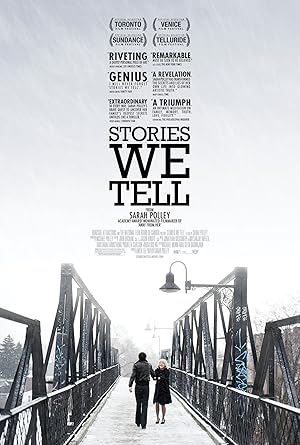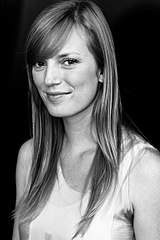
Stories We Tell Page #11
in terms of what they saw,
in terms of what they felt,
in terms of what they remembered,
and in terms of their loyalties.
The same set of circumstances
will affect different people
in different ways.
Not that there
are different truths.
There are different reactions
to particular events.
is to tell the truth,
to find the truth in a situation.
That's what it's about.
You realize,
when you've finished all this...
You realize,
when you've finished all this,
you've got about six hours of stuff,
and you'll decide
what you want out of it.
It'll be exactly like the story.
Each one of us will pick out...
If any one of us were
trying to edit it
and decide
what we wanted to keep,
it would be
the same farcical kind
of theatrical exercise
that we're all involved in.
"Oh, I want to keep that. "
"Oh, that's rubbish. "
That's an enormously
different thing
from simply doing
an interview straight
of it whatsoever,
but letting it run as it is.
That would have been at least
as close to truth as you can get,
whereas your editing of this
will turn this into something
completely different.
What would you say
this documentary is really about?
Am I breaking the fourth wall here?
Turn the camera around.
What is it about?
I feel like
it's about a lot of things.
Memory, you said.
Memory and the way
we tell the stories of our lives.
I think in many ways it's like
trying to bring someone to life
through people's stories of them.
Is this a good angle for me?
Sorry, go on.
Telling people what?
A**hole.
Hi, Harry.
One of the main focuses
in the documentary
are the discrepancies
in the stories.
All of us... you, me,
my dad, my siblings,
my mother's friends, et cetera...
have similar stories
with large and small details that vary.
I'm interested in the way
we tell stories about our lives,
about the fact that the truth
about the past is often ephemeral
and difficult to pin down,
and many of our stories,
when we don't take proper time
to do research about our pasts,
which is almost
always the case,
end up with shifts
and fictions in them,
mostly unintended.
In relation to Mom,
I think when we talk
about it as a family,
there seems to be this...
this kind of...
a lot of questions
about who was she.
You know, a lot of disagreement
about what kind
of a person she was,
and there's this misconception
that she was some thing,
and I guess that to me
is another misconception...
that there is a state of affairs
or a thing
that actually happened,
and we have to reconstruct
exactly what happened in the past,
and I don't think there ever was
a "what actually happened. "
I think there were
lots of perspectives
from the very beginning.
You don't ever get
to an answer.
You don't ever get to,
"Okay, now we've figured it out.
"We know exactly what happened,
"we know exactly what kind
of person she was. "
I think those things are just illusory.
Again, in terms
of the basic question,
"Can one get at the truth?"
You can certainly get
very close to it,
but you have to limit it to those
who are involved in the events...
directly involved and affected...
and the direct witnesses
to the events are only two,
and one is not around.
Diane's not here to talk to.
That's really the only person
who could provide
the essence, the essentials
of what took place.
So we went through
all of that debate,
and then we started here
yesterday.
I somehow feel that we've
cleared up some of the smoke.
Maybe not all, but some of the smoke
has been cleared away.
The reality is, essentially,
that the story with Diane,
I regret to say, is only mine to tell,
and I think that's a fact.
Now, my recollections
may be faulty at times,
but I'm not gonna lie.
The love that I shared
was so intense and so lasting,
it all came back to me
and got wrapped up
with my affection for you.
So I became crazy
about you in the same way.
When I heard the full details
of the affair
between Mom and Harry,
I was really happy
because I've always felt
looking for love,
and I certainly felt
that in the last years of her life,
and for a long time
ever since I was a child,
she really hadn't gotten
from Dad what she needed.
And when I heard
the story of Harry...
I remember feeling...
feeling really happy
that she had found love
and that she'd been loved
that much.
But I kind of think Dad
was the one she really
was in love with,
and he just wasn't an option,
so I'm really glad
that she was loved.
I'm not sure she was
loved by the person
she really wanted
to be loved by, but...
My dear Sarah,
when you make a documentary
about your own discovery
of a new father,
are you doing so to avoid
your own deeper concerns
of its real impact on you?
Is that why you describe it
as a search for the vagaries of truth
and the unreliability of memory,
rather than a search
for a father?
Hey, Dad.
I've been thinking
a lot about your last email.
Maybe you're right.
Maybe there is something
underneath my need
to make this film
that I've been denying.
Every time I feel I have
my footing, I lose it.
I can't figure out
why I'm exposing us all in this way.
It's really embarrassing,
to be honest.
Have I totally lost my mind,
trying to reconstruct the past
from other people's words?
Trying to form her?
Is this the tsunami
she unleashed when she went,
and all of us
still flailing in her wake,
trying to put her together
in the wreckage,
and her slipping away from us,
over and over again,
just as we begin to see her face?
What do you remember
of the day Mom died?
That was a terrible day, wasn't it?
I don't know. I guess...
I guess her brother
had said to us,
"Well, it's
almost the end now, and... "
"I think each one
of you should go... "
I mean, she was unconscious.
"And say whatever...
"Whatever final words
you have to say to her before she goes...
"because it's very close
to the end. "
So that was a bad day.
What did you say to her?
What?
With that time that we
each had alone with her,
what did you say to her?
Don't know.
Probably that I'd missed her...
that I would miss her,
that I loved her, and that...
would never forget her.
That's about all.
You know, somebody you've known
for 25 years...
and spent much of your life
with for 25 years,
and has given your life
much of its meaning for 25 years,
awful hard to lose them.
That's a dire line of questioning.
I tell you, we must find a way
of making it more funny.
What are you, some kind
of sadistic interviewer?
You told me
I had to break you down more.
Yeah, well, you've done it,
haven't you?
There was no acting
in any of that.
No acting at all.
You see what
Now you understand, don't you?
I remember that...
remember that day
when you directed me
Translation
Translate and read this script in other languages:
Select another language:
- - Select -
- 简体中文 (Chinese - Simplified)
- 繁體中文 (Chinese - Traditional)
- Español (Spanish)
- Esperanto (Esperanto)
- 日本語 (Japanese)
- Português (Portuguese)
- Deutsch (German)
- العربية (Arabic)
- Français (French)
- Русский (Russian)
- ಕನ್ನಡ (Kannada)
- 한국어 (Korean)
- עברית (Hebrew)
- Gaeilge (Irish)
- Українська (Ukrainian)
- اردو (Urdu)
- Magyar (Hungarian)
- मानक हिन्दी (Hindi)
- Indonesia (Indonesian)
- Italiano (Italian)
- தமிழ் (Tamil)
- Türkçe (Turkish)
- తెలుగు (Telugu)
- ภาษาไทย (Thai)
- Tiếng Việt (Vietnamese)
- Čeština (Czech)
- Polski (Polish)
- Bahasa Indonesia (Indonesian)
- Românește (Romanian)
- Nederlands (Dutch)
- Ελληνικά (Greek)
- Latinum (Latin)
- Svenska (Swedish)
- Dansk (Danish)
- Suomi (Finnish)
- فارسی (Persian)
- ייִדיש (Yiddish)
- հայերեն (Armenian)
- Norsk (Norwegian)
- English (English)
Citation
Use the citation below to add this screenplay to your bibliography:
Style:MLAChicagoAPA
"Stories We Tell" Scripts.com. STANDS4 LLC, 2025. Web. 24 Feb. 2025. <https://www.scripts.com/script/stories_we_tell_18926>.







Discuss this script with the community:
Report Comment
We're doing our best to make sure our content is useful, accurate and safe.
If by any chance you spot an inappropriate comment while navigating through our website please use this form to let us know, and we'll take care of it shortly.
Attachment
You need to be logged in to favorite.
Log In